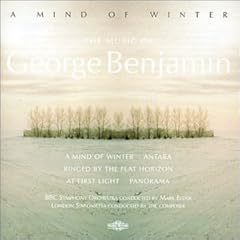
George Benjamin, Ringed by the Flat Horizon/A Mind of Winter/At First Light/Panorama/Antara BBC Symphony Orchestra, London Sinfonietta, Mark Elder, George Benjamin, etc. Nimbus Records, 2006.
Benjamins' ear for colour was clearly a legacy of his mentor Messiaen, and it is this which distinguishes the 20-minute 'Ringed by the Flat Horizon'. Thundering percussion and low brass (in itself something of a modernist staple) alternates with almost concerto-like passages for a more cello, writing that is more concerned with linear melodicism than with the sound groupings of the orchestral clamour (however delicately and painstakingly the details of these are sketched out - for Bejamin's work is anything but messy, unsurprising given the extreme care he takes in composing, spending years on fairly short pieces). The ten-minute setting of Wallace Stevens' 'A Mind of Winter' works with a more stripped-down sound palette, the melismatic and stretched/held notes of the soprano soloist bending Wallace Stevens' words into even extra resonance. By the time of that superb final line - "nothing that is not there and the nothing that is" - it seems not so much that the work is concluding or stopping, but that it is emptying itself out into silence - an emotional, as well formal necessity. The emotional scope and intensity packed into such a short space of time is nothing short of remarkable. 'At First Light', in three movements, juxtaposes the sort of orchestral drama and dynamic one might expect from 'Ringed by the Flat Horizon' - often dark and almost neurotically powerful - with some unexpected melodic strains that could have come straight out of Messiaen (or from somewhere between Messiaen and Debussy). A case in point is the utterly surprising end of the final movement, the final thirty seconds occupied with a woodwind melody that almost dances, a conclusion of surprising and wonderfully affirmative (yet understated) optimism which remains true to the spirit of the rest of the piece even if it seems a radical departure from it. Following is the more playful miniature 'Panorama', an offshoot of the piece it proceeds on the disc, 'Antara', showcasing the synthesized pan pipe sounds which remain Benjamin's only use of electronics. Using much more silence than is normal for Benjamin, the slightly jarring overlaps between notes could be said to be a drawback, resulting from the limitations of the technology of the time (nowadays, computers could create a much smoother effect), but arguably this limitation becomes a vital part of the piece's aesthetic, creating a tension between the desire for extremely long, held notes, or the smoothness seemingly demanded by the opening melody (which sounds almsot folky), and this near-glitchy, discontinuous electronic insistence. It's like a particularly violent enjambment in a poem, cutting across what seems to be the obvious sense and/or sonic pattern, though the piece sounds far less of emotional extrimities than some of the others might. 'Antara' itself manages the breathy pan-synths within the orchestral setting (often by means of merging them with the similarly-toned flute). High held notes over dark rumblings, sonic lava erupting inexorably through tympani roar, crescendos and subsidences maintaining a constant tension. The piece, these works taken together, are a human body engaged and strained to the fullest, a landscape whose smears are clarity, the brutal jewel of snow.


No comments:
Post a Comment